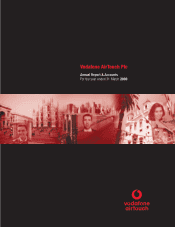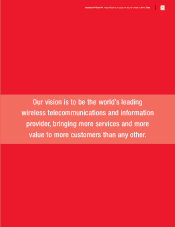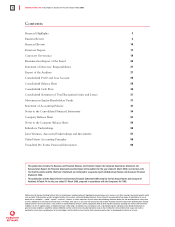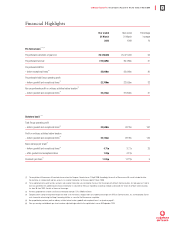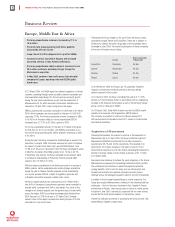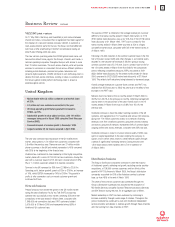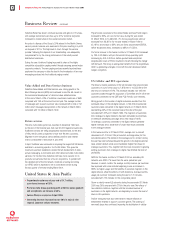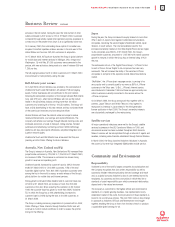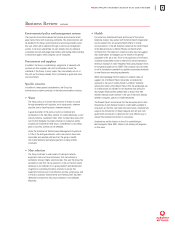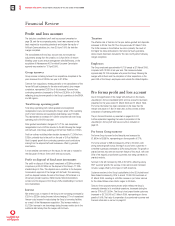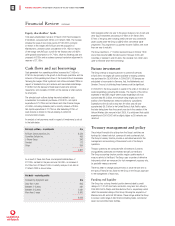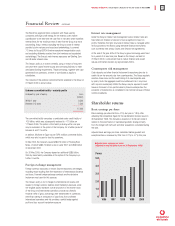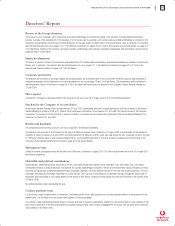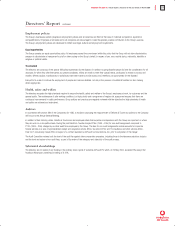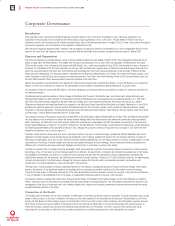Vodafone 2000 Annual Report Download - page 10
Download and view the complete annual report
Please find page 10 of the 2000 Vodafone annual report below. You can navigate through the pages in the report by either clicking on the pages listed below, or by using the keyword search tool below to find specific information within the annual report.
Vodafone AirTouch Plc Annual Report & Accounts for the year ended 31 March 2000
8
Responsibility for the Group’s community and environmental policy
lies with its Executive Committee, chaired by the Chief Executive.
Its successful implementation, therefore, is at the heart of the
Company’s strategic vision. In the case of joint ventures and associated
undertakings, where the Group does not have operating control, the
Group advises the management of its policies and actively encourages
them to adopt policies consistent with its own, offering practical advice
wherever appropriate. The Group is determined to properly discharge its
social and environmental responsibility.
Employment and labour standards
With over 40,000 employees across the globe, it is inevitable that some
of the Group’s employees work in countries with less well developed
employment legislation than others. Nevertheless, the Group seeks to
maintain high employment standards wherever it operates, and is
building an employment and human rights code that will apply to all
of the Group’s subsidiaries. Similarly, the Group’s health and safety
practice has been designed to provide the best working conditions for
all its employees throughout the world.
Community relations
Those who work for the Group live in widely differing communities.
It is important to employees that their company contributes properly
to local needs. Equally, the Group is intent on fostering good community
relations. To that end, the Group supports a wide range of continuing
community programmes around the world. This is not only a matter of
financial contribution but of real involvement by the Group and its
employees. The Group is increasingly using the special skills that it has
developed in the workforce, particularly in less developed countries,
where mobile communications can make a real difference. At the same
time, the Group continues to have a special interest in the furthering of
sport and physical recreation and assists a range of organisations,
including the police and those caring for historic buildings.
Climate change and ozone protection
In the UK, Germany and other major markets, governments have agreed
to make significant cuts in emissions of greenhouse gases in order to
reduce the impact of climate change. The Group is not a major polluter
but, in common with all responsible energy users, has a policy to
reduce its emissions at least pro rata to the national commitments.
To that end, an index of current resource use is being prepared to
provide a benchmark for the measurement of future achievement.
In the same way, the threat to the ozone layer has precipitated
regulations throughout the world for the phasing out of halons and
CFCs. The Group has, for some time, more than complied with this
policy. During 1999, use of CFCs in all the companies the Group
controls continued to be phased out, and a new strategy to phase out
halons was implemented. In parallel, a programme is being embarked
on that will ensure that, for new installations and when replacing worn
out or obsolete equipment, environmentally friendly substitutes will be
used, wherever they are effective. In particular, the use of both HCFCs
and HFCs will be avoided where appropriate alternatives exist.
Adherence to this programme is not only a proper contribution to the
environment but, with good design, will result in significant savings in
energy use.
Transport and retail
The year 2000 will see the production of a new Vodafone transport
policy that aims to combine significant fuel savings with cleaner vehicle
operation. In addition, Vodafone is putting a specific retail environmental
code into effect. This will combine significant environmental
improvements with saving money on energy and water costs, and
seeking innovative solutions to the issue of solid waste.
New Group headquarters building
Environmental Initiatives
Construction of a new headquarters building for Vodafone AirTouch Plc
recently began in Newbury and the programme incorporates the
following environmental initiatives:
•Energy saving
The buildings will incorporate a number of innovative energy saving
features. It has been estimated that there will be a 50% reduction
in energy consumption and a 50% reduction in carbon dioxide
emissions, compared with buildings currently occupied.
Maximising the use of natural light within the buildings will reduce
the demand for artificial lighting; and the new office interiors will
make use of innovative technology, such as controlling the use of
artificial lighting, to reduce energy demands.
•Water savings
Water resources will be controlled by the provision of balancing
ponds allowing the facility of recycling of grey water.
•Refrigeration and air conditioning
The systems used in present buildings will be replaced with those
that neither deplete the ozone layer nor contribute to global
warming.
•Integrated transport plan
Vodafone is to implement a comprehensive integrated transport
plan, working with West Berkshire Council in a Transport Quality
Partnership to achieve its ambitious aims and objectives.
Currently, around 83% of Vodafone employees in Newbury travel to
work by car, 77% of them as drivers. The aim is to reduce the
proportion of drivers to between 55-60% within the next three
years, by encouraging the use of public transport and other modes
of travel.
With the buildings at maximum capacity, car parking spaces will
only be provided for approximately half of the on site staff.
•Landscaping
Over 25,000 trees will be planted to help recreate former woodland
areas.
The planting of suitable trees and the creation of grassland areas,
scrub and ponds will also enhance the ecological interest of the
site. It is hoped this will provide a low-maintenance, natural setting.
No excavated material will be taken off site. It will be reused as part
of the landscaping, eliminating the need for lorry traffic to and from
the site.
Business Review continued

